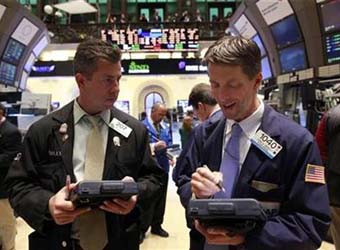U.S. stocks ended narrowly mixed on Tuesday as technology stocks recovered some of their losses.
The Dow Jones industrial average closed nearly 12 points lower at 22,284.32 in its first four-day losing streak since June 23. McDonald’s had the greatest negative impact on the index, while Apple had the greatest positive impact.
The tech-heavy Nasdaq composite was the best performer, shaking off a nearly 1 percent decline in the iShares Nasdaq Biotechnology ETF (IBB) and rising 0.15 percent to 6,380.16.
Information technology closed up 0.4 percent to lead three S&P 500 advancers, while telecommunications was the greatest laggard. The benchmark index closed less than 0.2 points higher at 2,496.84.
“Investors are being a little more cautious, some profit-taking going on, and also wanting to see if the president can get the Affordable Care Act repealed and [enact] any tax reform,” said Quincy Krosby, chief market strategist at Prudential Financial. But, she said, investors may show little conviction on stocks until earnings season.
Stocks opened higher Tuesday after falling Monday, when technology stocks dropped more than 1 percent in their worst day since August 17. The small-cap Russell 2000 hit a record high for the first time since July.
The Russell 2000 climbed Tuesday to an all-time of 1,460.95 and closed at a record 1,456.86.
The Dow transports rose for a fifth-straight day to a record high.
Fed Chair Janet Yellen said in a speech Tuesday that the Fed may have overstated the labor market’s strength and rate of inflation, indicating future monetary policy will be more accommodative than previously thought.
However, Yellen said the case for a gradual pace of adjustments is strengthened in the face of “significant uncertainties.” She also said the Fed should be “wary of moving too gradually” especially since “persistently easy monetary policy” might have “adverse implications for financial stability.”
“Yellen was obviously sounding a bit hawkish. That’s the main thing. No one obviously is concerned about the prospect of growth in the U.S. rolling over,” said Thierry Albert Wizman, global interest rates and currencies strategist at Macquarie.
While Yellen was speaking, the Treasury also auctioned $26 billion in two-year notes at a high yield of 1.462 percent.
The U.S. 2-year Treasury yield hit a high of 1.456 percent, its highest level since Nov. 5, 2008. The 10-year yield traded near 2.24 percent.
The U.S. dollar index hit a high of 93.286, its highest level since August 31. The euro traded below $1.1800.
In economic news, consumer confidence for September fell to 119.8 from 120.4 in August.
New Home Sales fell 3.4 percent in August, versus expectations for a gain.
The S&P CoreLogic Case-Shiller U.S. National Home Price NSA Index, covering all nine U.S. census divisions, reported a 5.9 percent annual gain in July, up from 5.8 percent the previous month and better than the 5.7 percent expected by economists polled by Reuters.
Oil prices edged off multi-month highs hit Monday. U.S. crude oil futures settled 34 cents lower at $51.88 a barrel.
Gold futures for December delivery settled down $9.80 at $1,301.70 an ounce. Earlier in the session, gold hit its highest since Wednesday.
Source: CNBC


